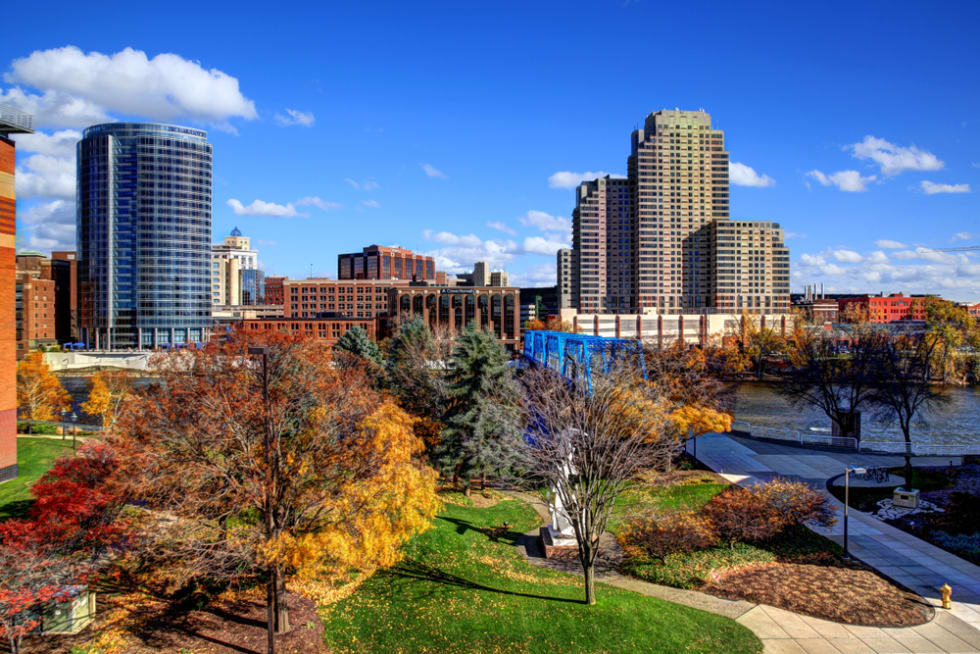Cost of Living in Michigan [2025]

Michigan is an incredible state known for immense natural beauty. From its Great lakes, beaches, and rivers to famous tourist destination like Mackinac Island, Henry Ford's Mansion, and Greenfield Village, it's no surprise that it attracts new residents and visitors each year. Plus, its four distinct seasons make it especially attractive for seasonal tourists. Whether you are interested in the stunning beauty or lifestyle ranging from a big city to country living, there are plenty of things to enjoy about life in Michigan.
Outdoor enthusiasts feel right at home in Michigan with all sorts of activities to enjoy, including top-notch golf, hunting, camping, and fishing. You can also check out some unbeatable nightclubs, restaurants, and wineries if that’s more your scene.
Overall, the cost of living in Michigan is considerably low, meaning you can easily find something within budget. The good news is, we’ve already done all the research, so you don’t have to. Start by checking out this apartment guide, then keep scrolling for all the details on building out your new budget in Michigan.
Cost of Living in Michigan
How Much Is Cost of Living in Michigan?
The cost of living in Michigan is 4.29% lower than the national average, making it the 26th cheapest state in the country. The average Detroit resident, where cost of living is 0.2% higher than the national average, spends $4,294 a month.
Where Is the Cost of Living Highest in Michigan?
The most expensive city in Michigan is Troy, where the cost of living is 10.23% higher compared to the state average and 5.5% higher than in the rest of the U.S. The average rent for a one-bedroom in Troy is $1,648 per month.
Where Is the Cost of Living Lowest in Michigan?
The cheapest major city in Michigan is Kalamazoo, with a cost of living being 11.71% lower compared to the state average and 15.5% lower than the national average. An average one-bedroom apartment in Kalamazoo is $915.

How Much Is Rent in Michigan?
In Michigan, the current overall average rent is $1,160 a month. A one-bedroom will cost you around $932, while a two-bedroom will generally go for around $1,196. Here's how those prices look in some of Michigan's most popular areas:
| City | One-Bedroom | Two-Bedroom | Overall |
|---|---|---|---|
| Detroit | $974 | $1,263 | $1,224 |
| Grand Rapids | $1,051 | $1,270 | $1,240 |
| Lansing | $938 | $1,217 | $1,169 |
| Ann Arbor | $1,227 | $1,503 | $1,423 |
| Kalamazoo | $915 | $1,116 | $1,067 |
How Much Is Housing in Michigan?
If you're not renting, then you should be aware that the median home value in Michigan is $201,100, and that Michigan residents spend around $1,472 a month on housing costs, including their mortgages.
Though the cost of living in Michigan is lower than the national average, you’ll still want to get an idea of what areas might be within your budget throughout the state. For a more detailed breakdown, here is a list of average rent prices of five of the best places to live in Michigan, including Detroit, Grand Rapids, Warren, Sterling Heights, and Lansing.
Michigan has rental properties in all forms, from country-style, single-family homes to high-rises located in the heart of bustling downtowns. There’s something to fit every renter’s taste in Michigan.
What Salary Do I Need to Live in Michigan?
The 30% rule states that in order to live comfortably, you should not spend more than one-third of your gross income on rent. At an average rate of $1,160 a month for a one-bedroom, you should earn a little over $44,000 a year to comfortably afford a one-bedroom in Michigan. Refer to the rental chart above for averages from specific cities in Michigan.
For comparison, MIT estimates that the annual living wage for Michigan residents before taxes is $42,187, which is a little under what we estimated to rent comfortably. You can also use our cost of living calculator to explore how much residents spend in different cities across Michigan.

How Much Are Utilities in Michigan?
The average utility bills in Michigan is $269.22 for a 915 sq. ft. apartment, which is slightly higher than the national average of $253.14 due largely to the cold winter temperatures. Here's how that breaks down across different areas and types of service:
| Location | Avg Electric | Avg Gas | Avg Water | Avg Fuel | Total |
|---|---|---|---|---|---|
| Michigan | 139.43 | 86.89 | 39.00 | 3.89 | 269.22 |
| Detroit, MI | 157.23 | 62.23 | 40.76 | 0.86 | 261.08 |
| Grand Rapids, MI | 177.12 | 22.47 | 58.40 | 0.44 | 258.42 |
Learn more about the estimated utility costs per city!
Keep in mind that these average costs do not include other expenses, such as the internet. The average monthly cost of internet of 60 Mbps or more, unlimited data, or cable/ADSL in these major cities is:
- Detroit: $72/month
- Grand Rapids: $62.38/month
- Warren: $56.67/month
- Sterling Heights: $65.94/month
- Lansing: $56.38/month
It’s also important to remember your cell phone bill, which averages $114 a month in the country. You might be able to save on some of these costs by bundling your cell phone with your internet provider. There are other discounts to look out for, too, including those for new customers, so don’t be afraid to ask your provider about these and more.
How Much Is Transportation in Michigan?
Getting around in Michigan can be costly, with average annual transportation costs of $10,204 for a single individual, according to the MIT Living Wage Calculator. If you’re a family of four with two working parents and two children, you can anticipate paying around $17,115 in transportation costs on an annual basis.
Michigan has 82 transportation agencies servicing the state. The Michigan Department of Transportation (MDOT) is the ruling agency over them all. Public transit providers include urban transit agencies, rural public transit agencies, and ferry boat service agencies.
While public transportation is one option, having reliable transportation is easier. You can get a better idea of the costs associated with having your vehicle by looking at the average gas prices in the major cities in Michigan:
- Detroit: $4.42/gallon
- Grand Rapids: $4.34/gallon
- Warren: $3.89/gallon
- Sterling Heights: $4.27/gallon
- Lansing: $4.90/gallon
Considering the national average is currently $4.40 per gallon of regular gas, Michigan’s gasoline costs are about average.

How Much Are Food Costs in Michigan?
The average single Michigan resident spends around $4,084 annually on food. For a family of two, with two working adults and two children, these costs nearly triple to $12,003 annually, or around $1,000 a month.
Note that these figures are associated with food picked up at the local Meijer, Kroger, or Westborn Market and entirely prepared in the home. You may also want to budget for additional food costs if you are anything short of a mastermind in the kitchen.
With so many delicious restaurants and iconic Michigan foods, it’s hard to resist a few meals outside of your kitchen. Don’t forget to account for eating out in your budget, including trying out the famous Coney Island hot dog, Buddy’s Detroit style pizza, tart cherries, and Frankenmuth Chicken.
Here’s a look at some of the average costs for a three-course meal for two people in a mid-range restaurant:
- Detroit: $60/meal
- Grand Rapids: $60/meal
- Warren: $50/meal
- Sterling Heights: $60/meal
- Lansing: $60.00/meal
How Much Is Healthcare in Michigan?
A single adult without children will pay around $3,080 for medical care in a single year. A family of four with two working adults and two children can expect to pay $7,946, not including child care. Childcare for two can add on an average of $22,840 per year.
Before making your big move, see what coverage is available in your new state by checking out the federal healthcare marketplace. You can report your move to make sure you qualify for out-of-state coverage if you happen to be relocating outside of an enrollment period, which usually falls in November.
If you’re moving out of state and still on your parents’ insurance plan, it is possible to maintain standing through their policy as long as you are under 26 years old. Check with your current provider before moving to see which doctors fall in the network in your new location to be sure.

Michigan Fitness and Entertainment
There is no shortage of fitness and entertainment opportunities in Michigan. Before moving to Michigan, take a look at this breakdown of some of these fitness and entertainment costs.
Fitness
While the summers are warm in Michigan, winters are windy, snowy, and freezing. These extreme colds can make outdoor exercise challenging in the wintertime. To maintain your fitness year-round, you might want to consider a gym membership.
Thankfully, the average cost of a monthly fitness club membership in Michigan’s major cities is relatively low:
- Detroit: $40.33/month
- Grand Rapids: $34.17/month
- Warren: $27.50/month
- Sterling Heights: $16.67/month
- Lansing: $16/month
Michigan has several outdoor activities that can help you save on costs when weather permits, including fly fishing the Au Sable River, mountain biking on the Keweenaw Peninsula, or boating the Great Lakes. But, if you plan to be outdoors year-round, remember that you’ll have to adjust your wardrobe accordingly, which will also come at an additional cost.
National and State Parks
Michigan is home to six national parks, including:
- Isle Royale National Park in Houghton
- Keweenaw National Historical Park in Calumet
- North Country National Scenic Trail
- Pictured Rocks National Lakeshore in Munising
- River Raisin National Battlefield Park
- Sleeping Bear Dunes National Lakeshore in Empire
In addition to the wide range of national parks, Michigan has over 100 state parks worth checking out, including:
- Mackinac Island State Historic Park
- Porcupine Mountains Wilderness State Park
- Warren Dunes State Park
- Tawas Point State Park
- Belle Isle State Park
Museums
You’ll find countless museums in Michigan, great for year-round family entertainment. Some of the most famous museums in the state include:
- Detroit Institute of Arts
- Motown Museum
- The Henry Ford
- Kalamazoo Valley Museum
- Gerald R. Ford Museum

Other Expenses to Consider in Michigan
It’s hard not to love Michigan with its flat income tax rate. However, some cities do charge additional tax rates. Additionally, the state sales tax rate is low, with no additional local sales taxes, meaning the 6% rate is across the state.
Other expenses to consider come from big moves from out of state. Movers, storage, hotels, and transportation are just a few costs that may sneak up on you. Apartment application fees, security deposits, pet deposits, and other optional add-ons are other additional fees that may come when you move to your new home.
Lastly, don’t forget about furnishing your new home, which also comes at an expense. You’ll have to account for this spending in your budget since you’ll want to do some decorating to make it feel like a home. To avoid overspending in this area of your move, check out a few tips on how to decorate your apartment on a budget.
Finding the Best Michigan Apartment for You
If you want to move to a beautiful state with four distinct seasons and everything from country to big city living, Michigan might be the state for you. Register with Apartment List today and start checking out the thousands of available apartments to rent in Michigan!
FAQ: Cost of Living in Michigan in 2023
How expensive is an apartment in Michigan?
Currently, the overall average rent for Michigan residents is $1,160 a month. One-bedrooms are listed, on average, around $932, while two-bedrooms are generally closer to $1,196. Scroll up to see how those prices break down in some of Michigan's most popular cities.
What is the cheapest rent in Michigan?
The cheapest rent in Michigan is a one-bedroom apartment, with an average rent of $932 for the entire state.
How expensive is it to live in Michigan?
Michigan is the 26th cheapest state in the country, around 4.11% lower in cost of living than the country-wide average. Rent in the Great Lakes state averages $932 per month for a one-bedroom apartment.
How far is Michigan from Ohio?
Michigan to Ohio is 365.1 miles and takes about 5 hours and 42 minutes to drive. It takes under an hour to fly from Mighian to Ohio.
How far is Michigan from New York?
It takes 820.1 miles to drive from Michigan to New York and takes about 13 hours. To fly, it takes about one hour and thirty minutes.
How far is Indiana from Michigan?
It's 320.3 miles from Michigan to Indiana and takes just over five hours to drive. The flight time between Michigan and Indiana is about an hour.
What is the population of Michigan?
According to the US Census Bureau, there are 10,037,261 people living in Michigan. The population of Detroit is 633,218.
What is a good salary in Michigan?
To comfortably live in a one-bedroom apartment in Michigan, you should earn at least $27,200 a year to live in Detroit. To comfortably live in a one-bedroom apartment in Michigan, you should earn at least $33,400 a year to live in Lansing. According to the US Census Bureau, the median income in Michigan is $63,202, giving a little extra room in your budget.
Share this Article





